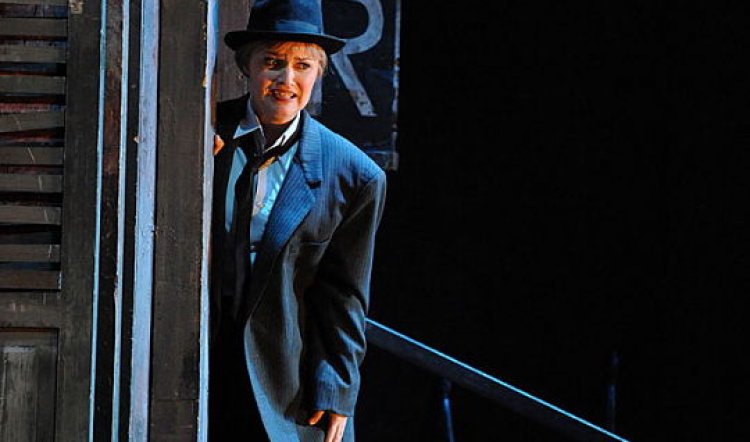
RIGOLETTO
RIGOLETTO, Opera Australia at the Sydney Opera House., September 18-November 4, 2010. Photos: Branco Gaica
WINTER productions are always a matter of Russian roulette with colds, flu and other respiratory ailments playing havoc with singers and casting. This Sydney winter has been particularly bad – according to my doctor – and no more so than for one of Opera Australia’s favourite warhorses, Elijah Moshinsky’s production of Rigoletto. On opening night the main victim was the old jester himself, in the person of Alan Opie, and illness continues to make its way through the cast. Emma Matthews (Gilda) was suffering in the days leading up to opening night and, most cruelly, on his return from Europe to appear for the company, Paul O’Neill (Duke of Mantua), is now struggling and was quite obviously in trouble on Thursday night (September 23) while the production was being filmed for later DVD release.
It was a relief when artistic director Lyndon Terracini confirmed, during the second interval, what many in the audience must have realised – that O’Neill was really unwell, but would struggle on for the remainder of the performance. It at least meant that when his voice cracked, wavered and missed the top notes of the Duke’s fabled party-piece, “la Donna è mobile”, the wave of sympathy from the house was palpable. And he deserved the warm applause at curtain call: singing through such obvious distress and difficulty was heroic. It will be good to hear him at full strength, with Emma Matthews, before he returns to Europe in late October.
Vicious viruses aside, it’s a huge pleasure to revisit the 1991 Moshinsky production (now with rehearsal director Cathy Dadd sharply at the helm). Some time-specific or design-specific productions don’t stand up to the passing of years, but in setting it so firmly in the milieu and look of La Dolce Vita, Moshinsky and designer Michael Yeargan, with lighting designer Robert Bryan, gave Rigoletto a currency that is as relevant today as it was almost 20 years ago.
In truth, the louche party scene has extra contemporary resonance with a be-robed Catholic cardinal dancing with a scantily-clad trollop (no nubile boys handy, I guess); an Anita Ekberg look-alike posing for celeb shots and, later, the giggling gang of masked young blades coming after Gilda with the tipsy menace and sense of entitlement we now associate with footy teams. You could say the production is either merely classic or remarkably prescient.
On the bright side, the tightly contained revolve of hyper-realist interiors and outdoor vignettes suits the Opera Theatre and also enhances the busy, lush, mod-Roman feel. It looks good, works well and is easily refreshed through the introduction of new casts.
Most notable in this cast is, of course, Emma Matthews. She made her role debut as Gilda in the Brisbane season in 2009 and this year, having Covent Garden (Cunning Little Vixen conducted by Sir Charles Mackerras) under her belt and a Melbourne and Sydney triumph in La Sonnambula, she is now simply magnificent – vocally – and as convincing and charming as she ever has been as an actor. It’s a joy to see an artist grow, mature and fulfill early promise in a business that often chews up and spits out its tender babes with shocking nonchalance.

As her father, the old jester Rigoletto, Alan Opie had clearly recovered from his opening night illness and was both touching and great to hear. He makes the journey, from ill-concealed anger at the haute monde that taunts him, to realisation of the tragedy he has wrought in seeking revenge, with conviction and pathos. That Rigoletto is really about class war was never in doubt.
Given his obvious distress, it would be unfair to say anything about Paul O’Neill other than he looks the part of the handsome Duke and has a tenor voice that must surely be beautiful when he’s well; but at the moment he’s struggling. Criticism of his alleged “lack of stamina, pitch accuracy and vocal and dramatic presence” might have been tempered or even discarded if a pair of humane eyes and ears had been attached to the opinion.
The rest of the cast are all fine and serve the production and one another well: David Parkin as the assassin and publican Sparafucile, is scary and simultaneously attractive; Jane Parkin is a voluptuous Countess Ceprano, and Christopher Hillier makes a nicely outraged popinjay Count Ceprano; and Elizabeth Campbell doubles beautifully in the contrasting roles of Rigoletto’s arthritic housekeeper, then as a cougar-ish Maddalena – the publican’s sister.
Conductor Giovanni Reggioli draws on the AO & Ballet orchestra’s considerable resources to bring out the luscious yet often fragile qualities of Verdi’s much-loved score. The OA chorus is also in on the deal and the ensemble produces washes of glorious music that are vivid and heart-rending. If you love the opera, you’ll love this incarnation of the old production.



